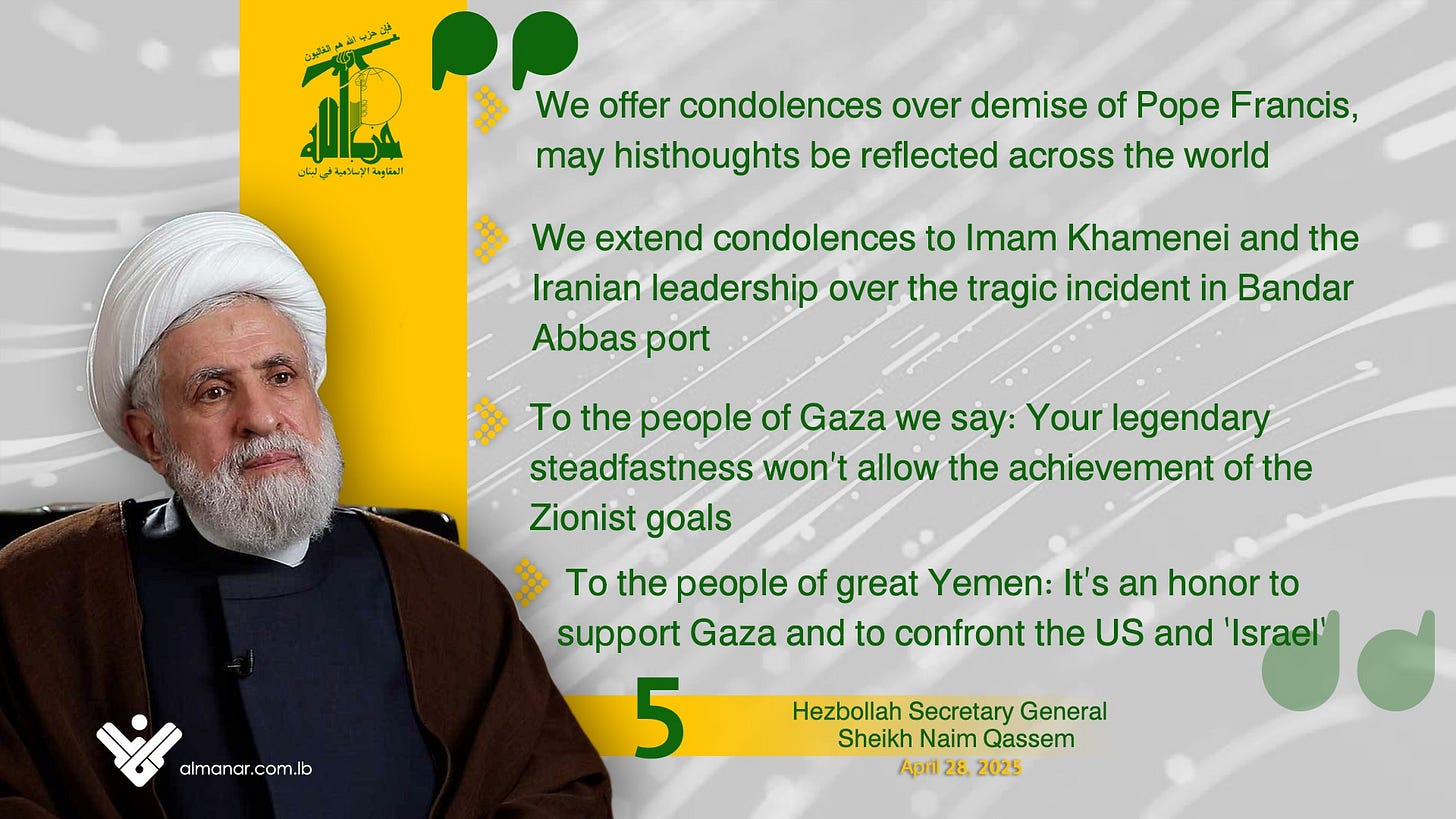Ending Israeli Aggression Lebanon’s Top Priority, Sheikh Qassem Says
No priority supersedes this, As long as Lebanon remains under threat and Israeli occupation forces hold its land, genuine state-building is impossible, he stated.
Lebanon, PUREWILAYAH.COM - In a televised speech aired on Monday, April 28, 2025, via Al-Manar TV, Hezbollah’s Deputy Secretary General Sheikh Naim Qassem emphasized the critical importance of Lebanon’s upcoming municipal elections.
He stated that certain political conditions must be met to ensure these elections are conducted properly and contribute meaningfully to building a sound state.
His Eminence urged municipal candidates to be competent, well-regarded, and genuinely interested in public service. He also called on Lebanese citizens for a “strong turnout and active participation,” asserting that such civic engagement would help propel the country’s development and nurture a sense of collective national responsibility.
Ending Israeli Aggression: Lebanon’s Top Priority
Sheikh Qassem declared that Lebanon’s foremost national priority must be ending Israeli aggression, achieving full withdrawal of occupation forces from southern Lebanon, and securing the release of Lebanese detainees.
“No priority supersedes this,” he stated. “As long as Lebanon remains under threat and Israeli occupation forces hold its land, genuine state-building is impossible. Pressures will persist day and night.”
Ceasefire Violations and Government Inaction
Sheikh Qassem revealed that a ceasefire agreement, reached through indirect negotiations with the Israeli entity, went into effect on November 26, 2024. Hezbollah, he noted, had honored the agreement completely, including allowing the Lebanese Army to deploy south of the Litani River.
However, he condemned the Israeli regime for violating the ceasefire more than 3,000 times—a fact even acknowledged by France—while the United States, he said, continues to shield Israel with political cover.
“We handed over the responsibility to the state,” Sheikh Qassem explained, “but the pressure exerted has been minimal. The state must act daily with firm diplomatic resolve.”
He called on the Lebanese government to summon the ambassadors of the five permanent members of the UN Security Council, file formal complaints, and directly confront the American ambassador for enabling continued Israeli aggression.
Condemns Israeli Strike on Dahiyeh
Addressing the Israeli attack on Beirut’s southern suburbs (Dahiyeh) the previous Sunday, Sheikh Qassem condemned the strike as a political assault aimed at altering the rules of engagement.
“This was a deliberate escalation,” he said, “carried out with American authorization.” He cited Israel’s continued killing of civilians, destruction of homes and farmlands, and forced displacement campaigns as part of a broader strategy of aggression.
While acknowledging initial reactions from Lebanon’s president and prime minister, he insisted that “more is required” to raise Lebanon’s voice internationally and exert diplomatic pressure on the U.S.
Resistance as the Foundation of Strength
Reaffirming Hezbollah’s doctrine, Sheikh Qassem stated, “Lebanon’s strength lies in its resistance, its people, and its army.” He warned against any return to a weakened Lebanon like that of 40 years ago.
“The U.S. will only engage seriously with Lebanon when it sees a strong and steadfast nation,” he said. “Victory will ultimately be ours, because we have a people driven by faith and sacred commitment to liberation and dignity.”
He urged the Lebanese government to remain firm in the face of pressure and resist making any concessions that could compromise national sovereignty.
Reconstruction: A Delayed National Imperative
Turning to post-war rebuilding, Sheikh Qassem declared that “reconstruction” is Lebanon’s second national priority and sharply criticized the government for its delay in launching a comprehensive plan.
“Why has the government not yet started reconstruction?” he asked. “Rebuilding is an essential component of the ceasefire agreement. Failure to begin this process hampers economic recovery, deepens inequality, and alienates large parts of the population.”
He noted that Hezbollah had already taken the initiative to provide shelter and basic repairs, stating, “No resistance movement in the world has done what we’ve done in this regard.”
Sheikh Qassem thanked Iran and its people—especially Supreme Leader Imam Sayyed Ali Khamenei—for their support. He questioned the lack of wider local and international involvement in Lebanon’s reconstruction.
Reaffirming the Path to State-Building
As the third major priority, Sheikh Qassem highlighted Hezbollah’s commitment to state-building. He pointed out the movement’s support for the election of President Joseph Aoun, its role in government formation, and parliamentary backing of the cabinet as clear indicators of that commitment.
“We are firmly committed to building the state,” he said. “Our actions before and after the Israeli aggression prove it.”
He warned against divisive rhetoric, especially efforts to pit the Lebanese Army against the resistance. “These attempts will not succeed,” he affirmed. “We must support President Aoun’s efforts in reconstruction and in expelling Israeli forces from our territory.”
Promoting Unity in Municipal Elections
Returning to the theme of municipal elections, Sheikh Qassem urged for the unity of Lebanon’s villages and towns, calling for inclusive and consensus-based local councils.
He announced that Hezbollah and the Amal Movement had agreed to form municipal councils through mutual consensus, ensuring broad representation across families and political forces.
“Candidates must reflect political coherence, avoid factionalism, and prioritize public service and sound financial management,” he said. “Let us work together for development.”
Offering Condolences and Regional Solidarity
In a separate part of his speech, Sheikh Qassem extended condolences to the Christian world over the passing of Pope Francis, expressing hope that the Pope’s ideas would continue to inspire humanity.
He also sent condolences to Iran’s leadership and people, including Imam Sayyed Ali Khamenei, over the martyrs and injured in the Shahid Rajaee Port incident.
Turning to Gaza, Sheikh Qassem saluted the steadfastness of the Palestinian people in the face of relentless U.S.-Israeli-Western aggression, stating that their resistance “will thwart the enemy’s objectives and ensure inevitable victory.”
He also praised Yemen’s leadership and people for their continued resistance against American, Israeli, and British aggression, affirming that Yemen remains firmly aligned with Gaza in the face of Zionist hostility.
Source: Al-Manar Website



